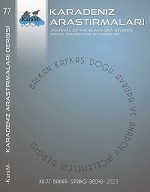OSMANLI DEVLETİ’NDE ULUFELERİNİ GÜMRÜK MUKATAALARINDAN ALAN CAMİ GÖREVLİLERİ (H. 1099-1182 / M. 1688-1769)
THE MOSQUE STAFF IN THE OTTOMAN EMPIRE THAT RECEIVED THEIR SALARIES FROM THE CUSTOMS REVENUES (H. 1099-1182 / 1688-1769)
Author(s): Hakan Doğan, Fatma Ünyay AçikgözSubject(s): Customs / Folklore, Economic history, Islam studies, 6th to 12th Centuries, 17th Century, 18th Century, The Ottoman Empire, History of Religion
Published by: Karadeniz Araştırmaları Merkezi
Keywords: Mosque; Religion Staff; Ulufe; Customs; Mukataa;
Summary/Abstract: In the Ottoman Empire, mosques were one of the most important institutions that performed various functions apart from worship. The expenditures such as construction, repair, lighting, heating, maintenance and wages of the mosque officials constituted the basic expenses of the mosques. These expenses were sometimes met from the central treasury, sometimes from real estate revenues, whose revenues were donated for mosques, and sometimes from direct donations in kind and in cash from the people of the region where the mosque was located. In the Ottoman Empire, many officials were serving in mosques. Among the main of these officials; there were imam, hatip, muezzin, preacher, kayyım, ferraş, devir-hân, kâri (kurrâ), na’t-hân, tariffhân, muvakkit, enam-hân, muarrif, sure-hân, cüzhân and dersiam. The salaries and wages of the said officials were mostly paid through the waqifs of the mosques or masjids they were in charge of. Waqifs, which also served in other fields, became so widespread in the Ottomans that almost every mosque had at least one real estate. Sometimes the incomes of the waqifs were too low to meet the needs of the mosque or the waqıfs were disappearing themselves. In this cases where the waqif revenues were insufficient, various sources of income were used to meet the expenditures partially or completely. One of the sources that the state used for the payment of the salaries of mosque officials was customs revenues. So much so that in the Ottoman Empire, it is seen that the salaries of the officials in some mosques were paid from the revenues of customs revenues instead of waqifs incomes. In this study, duties of people working in mosques of the different regions of the Ottoman geography and the amount of their salaries from customs revenues were evaluated through the data on the berat (royal degree) copies in Cumhurbaşkanlığı Osmanlı Arşivi (The Presidential Ottoman Archive) Ali Amirî (AE.SMHD.I, AE.SMST.II, AE.SMST.III, AE.SAMD.III) classification (1688-1769).
Journal: Karadeniz Araştırmaları
- Issue Year: 2023
- Issue No: 77
- Page Range: 83-109
- Page Count: 27
- Language: Turkish

